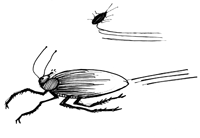STRANGE BUT TRUE- Not new math: How a few good angles save roaches

DRAWING BY DEBORAH DERR McCLINTOCK
Q. What's the mathematical curiosity behind the survival of those pesky household cockroaches, despite humans' efforts to swat them out of existence? –J. Agresto
A. Roaches are survivors, going back some 300 million years, reports an article in Science magazine. When threatened, most of them often skitter away in some unexpected direction and disappear out of sight. The choice of escape trajectory must be sufficiently variable that a predator cannot learn to predict it– yet should exclude, in a nonrandom manner, running toward the source of danger.
Researchers recording the multiple-choice trajectories of five roaches responding to a wind stimulus– not unlike a newspaper boom being lowered by a swatter– found that the wily insects first turned away and then raced along one of four preferred routes at roughly 90 degrees, 120 degrees, 150 degrees, or 180 degrees relative to the stimulus. Moreover, these results tended to be similar across the 86-member cockroach colony.
"Though these routes are not random and are limited in number," the article noted, "they clearly suffice for the cockroach to live another day."
Q. Why doesn't money buy happiness? Isn't it because happiness "comes from within," making it pretty much an "individual matter"? –J. W. Hingeley
A. That's what many pundits claim and even many psychologists subscribe to, but they're forgetting that money means much more than purchasing power, say Ed Diener and Robert Biswas-Diener in Happiness: Unlocking the Mysteries of Psychological Wealth.
Maybe many of us would like to believe that people from all walks of life have an equal chance of fulfillment. But in fact, money and happiness bear a rather strong correlation worldwide. When self-report surveys are taken, affluent nations such as Denmark, Switzerland, Canada, and Sweden show the greatest percentages of people rating their lives as very satisfying.
In one study of millionaires, 47 out of 49 who reported put themselves in the high-happiness bracket. Lottery winners too have given themselves higher ratings. When Richard Lucas and Ulrich Schimark studied a large German sampling, life-satisfaction followed money in step-by-step fashion from below 6.5 for those earning below $10,000 (U.S.), to 7.0 for $60,000-70,000, to 8.0 for those above $200,000.
And it all makes sense considering that people with money have greater status, more control over their lives, better health insurance and security, and have unique opportunities to make a lasting contribution to society.
The worst cases are people around the world who have moved to cities and joined the market economy but have extremely low incomes to meet their needs and aspirations. Poor or rich, materialists are generally less satisfied with their lives than folks who value love, friendship, and other worthwhile pursuits.
Conclude the authors: "It is good for a person's happiness to have money but toxic to want money too much."
Q. Water is composed of hydrogen and oxygen, the first highly combustible and the second supporting combustion. So why won't good old H2O go up in flames?—T. Frederick
A. Because H2O is already a product of combustion, formed when highly combustible H2 and O2 gases mix, often explosively so, says Brandeis chemist Anatol Zhabotinsky.
This has been the cause of many disastrous accidents. But once the stuff has burned, it's done, and resultant water molecules are highly stable.
If you really want to make water burn, adds New York University chemist Henry Brenner, you could decompose it via electrolysis into its hydrogen and oxygen gas constituents, then fire these up (react them) again. Of course you still wouldn't actually be burning the water; you'd be burning the hydrogen.
Q. What was perhaps the smallest big thing in your life, measuring barely the size of a period at the end of a sentence? –B. Bateman
A. That's roughly the size of your Mom's egg that got fertilized to eventually become you, says David Myers in Psychology in Everyday Life. Small as it was, it was about 85,000 times larger than the cell from your Dad that completed this miraculous duo.
That cell was only 1 out of 200 million or more that began the race upstream, with only a tiny fraction making it all the way to the egg, and only the luckiest one able to penetrate the protective coating and effect a fusion of the two nuclei. Happy you-to-be!
~
Send Strange questions to brothers Bill and Rich at [email protected].
#